We live in a society where people are always on the go, have hectic schedules, and are always under pressure. Finding moments of peace and balance is crucial. The embrace of nature, especially in the form of flowers’ beauty and meaning, may be a source of comfort and tranquility. Numerous civilizations have long acknowledged the significant influence flowers may have on our mental and emotional health. These delicate, colorful, and fragrant blossoms have the amazing power to inspire, uplift, and induce emotions of tranquility.
We explore the field of floral therapy in this investigation and highlight 15 gorgeous flowers, each with special qualities that symbolize and support mental health. These flowers provide more than just visual appeal; from the calming scent of lavender to the upbeat optimism of sunflowers, they symbolize a natural means of nourishing our emotional and psychological states. So let’s take a tour through these blooms and learn about their therapeutic properties as well as the tremendous effects they may have on our inner selves.
Valerian
Native to Europe and Asia, Valerian (Valeriana officinalis) is a perennial plant. It is a traditional natural cure for a wide range of illnesses, including mental health problems. Because of its well-known sedative and soothing effects, Valerian is a popular supplement for those who struggle with stress, anxiety, and sleeplessness.
Because valerenic acid and valeranone interact with the brain’s GABA receptors, these are the main ingredients that provide Valerian its therapeutic benefits. Gamma-aminobutyric acid, or GABA, is a neurotransmitter that aids in controlling the central nervous system’s reactions to stress and anxiety. Valerian aids in relaxing and lessens tension and anxiety symptoms by increasing GABA activation.
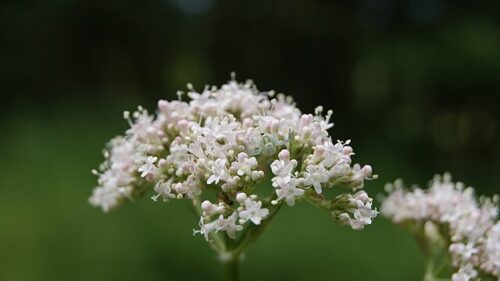
Tea, extracts, and capsules are the most common forms of Valerian consumption. Those who suffer from sleep problems will find it especially helpful as it may enhance sleep quality and relieve insomnia. The muscular tension and headaches associated with stress may also be relieved by Valerian.
Valerian: Well-known for its relaxing and soothing qualities, valerian is often associated with mental health because of its capacity to reduce stress, anxiety, and sleeplessness.
Lavender
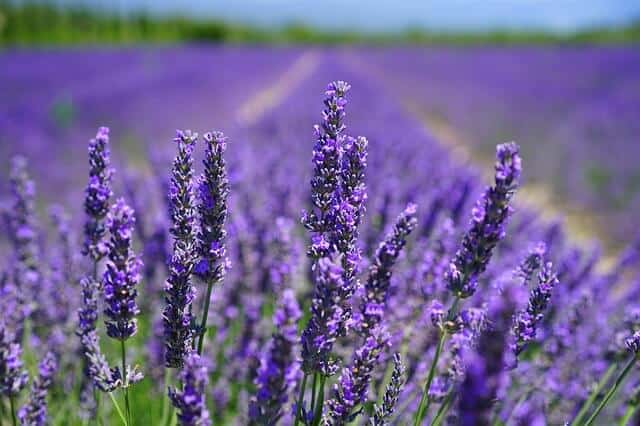
The aromatic herb lavender (Lavandula) is well known for its relaxing and comforting qualities. Since ancient times, people have used the lovely purple flowers of lavender to encourage relaxation and mental health. The capacity of lavender essential oil to lessen tension and elevate mood makes it a popular option in aromatherapy. Lavender essential oil is collected from the flowers.
The aroma of lavender oil may significantly lower tension and anxiety levels when inhaled. Lavender scents are believed to increase dopamine and serotonin levels in the body, which are neurotransmitters linked to emotions of contentment and calmness. Additionally, lavender may help reduce depressive symptoms and enhance the quality of sleep.
There are many uses for lavender, including sachets, teas, essential oils, and bath preparations. It may be relaxing and helpful to enhance mental clarity to add a few drops of lavender essential oil to a diffuser or bath.
Also Read :
Flower That Symbolizes Abandonment – Anemone(Windflower)
Top 30 Flower That Symbolizes Hope
Top 19 Flower that Means Happiness (And Love)
Chamomile
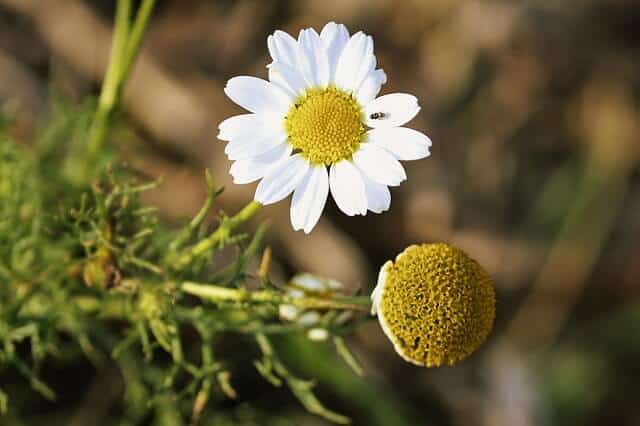
It’s common to use the mild and calming herb chamomile (Matricaria chamomilla) to reduce anxiety and encourage relaxation. Known for having moderate calming qualities, it’s often drunk as a tea. Since chamomile tea promotes relaxation and eases sleep, it’s a popular beverage to have before bed.
When apigenin, one of the active ingredients in chamomile, binds to brain receptors, it reduces anxiety and promotes relaxation. Anti-inflammatory qualities of chamomile are also well-known, and they may aid in easing the physical signs of stress and strain.
Because it contains no caffeine, chamomile tea is a great option for those who want to naturally manage their anxiety symptoms or relax after a stressful day. You may include frequent consumption of it into your self-care regimen to help support mental health.
Chamomile is one of the preferred flowers for mental health and is known for its relaxing and soothing properties. As you wind down for the night, a warm cup of chamomile tea may help your mental health by encouraging relaxation and reducing anxiety.
Roses

A unique position is reserved for roses (Rosa), not just for their beauty but also for their significance to mental health. Roses have a relaxing and uplifting influence on the mind and soul, and their aroma is often associated with love. Roses are a representation of beauty and have a nice effect on emotions and mental health.
By distilling rose petals into essential oil, aromatherapists may lessen symptoms of depression, anxiety, and tension. According to popular belief, the scent of roses helps to elevate one’s self-worth, regulate emotions, and foster overall wellbeing.
Rose petals may be used for more than just aromatherapy. They can be used to generate rosewater, which can be used as a face spray or added to baths. Adding roses to your space in the form of potpourri or bouquets may help lighten the mood and create a cozier, happier feeling.
Roses are associated with mental health because of their ageless beauty and alluring scent. These flowers are often associated with feelings of pleasure and love. The aroma of roses may lift one’s spirits, lower stress levels, boost confidence, and enhance overall well-being.
Sunflowers
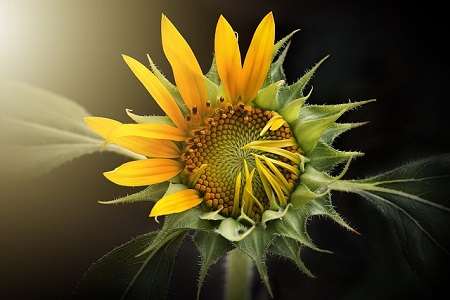
The bright yellow petals of sunflowers (Helianthus) and their daily path around the sun are well-known for their optimistic and upbeat meaning. Positive effects on mental health are also possible with these happy flowers.
Sunshine and bright hues like sunflowers may make you feel happy and uplifted. Having sunflowers around oneself or just staring at them might help lessen depressive and anxious sensations. Their presence might act as a helpful reminder to keep your attention on life’s good things.
Furthermore, sunflower seeds are a nutrient-dense snack full of minerals like magnesium, which is critical for preserving mental health. Magnesium helps to lower stress and regulate neurotransmitters.
St. John’s Wort
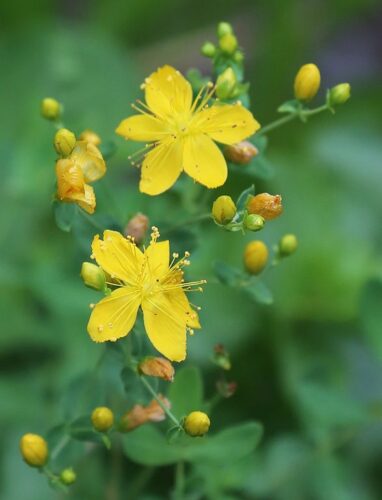
Traditional uses of the herbal treatment St. John’s Wort (Hypericum perforatum) include treating anxiety and depression, among other mental health conditions. Reportedly possessing antidepressant and mood-stabilizing qualities are the active ingredients in St. John’s Wort, namely hypericin and hyperforin.
Studies indicate that St. John’s wort may raise serotonin and other neurotransmitter levels in the brain. As a result, depression symptoms may lessen and mood may improve. St. John’s Wort should be taken under the supervision of a health care practitioner since it may interact with other drugs.
Typically, St. John’s Wort comes in a variety of formats, including as teas, extracts, and capsules. Before taking it as a therapy for mental health disorders, it is imperative that you speak with a healthcare professional.
Jasmine
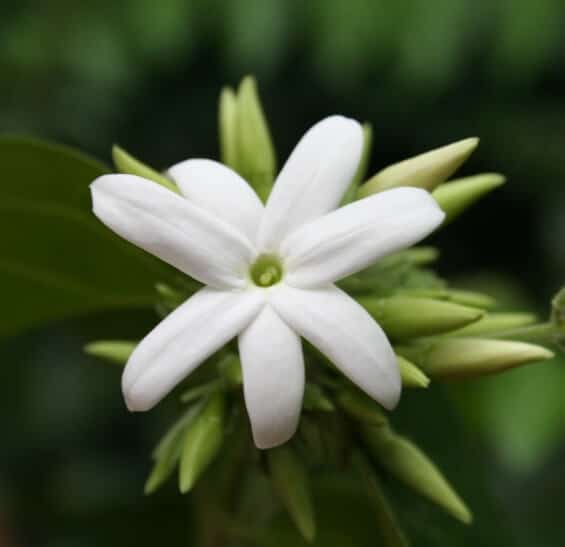
The fragrant jasmine (jasminum) flower is well-known for its lovely scent, which provides a mental balancing and energizing effect. Aromatherapy often uses the perfume of jasmine to ease anxiety and encourage calm.
Using jasmine-scented items or inhaling the perfume of jasmine essential oil might help elevate mood and lessen stress. Additionally, jasmine is associated with improved cognitive function and attentiveness. It may improve mental clarity and focus.
Another method to feel its calming benefits is by drinking jasmine tea, which is prepared from the blooms of the jasmine flower. Jasmine tea is a great option for unwinding and relieving stress since it may make you feel peaceful and cozy.
Passionflower
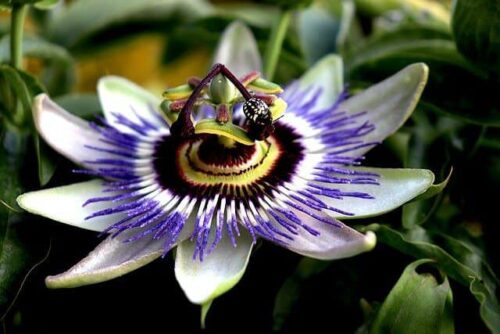
For generations, people have used the lovely and ornate flowers of the climbing vine Passiflora incarnata to treat anxiety and sleeplessness. The name of the plant comes from the passion of Christ since the structure of the blossom was thought to represent the crucifixion.
Certain chemicals found in passionflower have a relaxing impact on the central nervous system. It works by raising the brain’s gamma-aminobutyric acid (GABA) levels, which lessen anxiety and promote relaxation. Supplements, tinctures, and herbal teas often include passionflower.
As a tea or supplement, passionflower may lessen restlessness, enhance sleep quality, and lessen symptoms of generalized anxiety disorder. Regarded as a secure and non-addictive substitute for prescription anxiety drugs, it is safe.
Peppermint
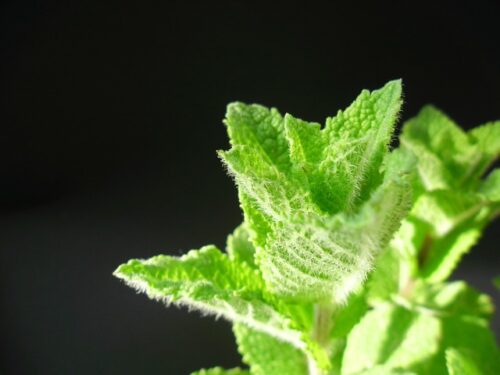
The revitalizing aroma and digestive advantages of peppermint (Mentha × piperita) make it a delightful plant. Its invigorating scent may positively affect mood and cognitive function, even if it may not be directly associated with mental health.
It is well recognized that the scent of peppermint improves focus and alertness. Drinking peppermint tea or inhaling peppermint essential oil might help stimulate mental clarity, lessen mental tiredness, and increase energy.
Additionally, peppermint may help reduce the physical signs of stress, such tension headaches and upset stomachs. It is a great complement to your self-care regimen because of its calming effects on the body and mind.
Another amazing flower from nature that isn’t often associated with mental health is peppermint. Its stimulating scent may invigorate the mind, lessening mental exhaustion and fostering a feeling of vibrancy. Furthermore, peppermint is an unexpected but useful partner in our search for mental peace since it may relieve the physical signs of stress, such as tension headaches.
Echinacea

The bright purple flower echinacea, or Echinacea purpurea, is well recognized for its ability to strengthen the immune system. A robust immune system may indirectly improve mental health by lowering the likelihood of sickness and associated stress, even if its primary function is to support physical health.
Stress may impair immunity, making a person more vulnerable to diseases and infections. Supplements and teas containing echinacea have the ability to enhance the immune system and lessen the negative effects of stress on the body.
Immune-boosting herbs such as echinacea may help maintain physical health, which in turn supports mental health. A healthy body is better able to withstand stress and the hardships of everyday living.
Well-known for strengthening the immune system, echinacea also indirectly supports mental health by assisting the body in warding off infections and lessening the effects of stress. A healthy body is more resilient to stress and the trials of everyday living.
Marigold
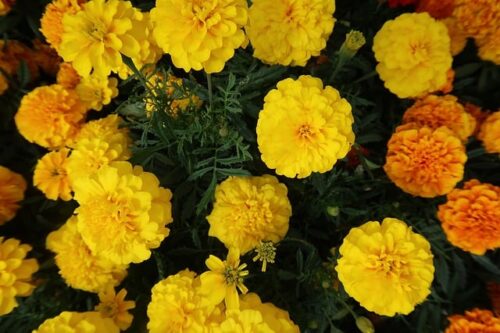
Marigolds, or Tagetes, are a cheery and colorful flower with vivid orange and yellow blooms. It frequents flower arrangements and gardens as a beautiful plant. Marigold’s vivid look may have a favorable effect on mood, despite the fact that it is not often associated with mental health.
The vivid hues of marigold flowers have the power to inspire joy and optimism. Having bright colors and the outdoors around oneself may improve mood and lessen stress. Furthermore, taking care of plants like marigolds and gardening may be a calming and relaxing hobby that enhances mental health.
Marigold is not often utilized in aromatherapy or herbal therapies for mental health, but it may create a happier and more peaceful atmosphere when it is used in outdoor settings and flower arrangements.
Marigolds may not be often associated with mental health, but their cheery look may quickly improve your mood. Marigolds have vivid orange and yellow flowers. Marigold gardening may be a relaxing and grounding pastime that builds a connection with nature and helps mental well-being.
Geranium
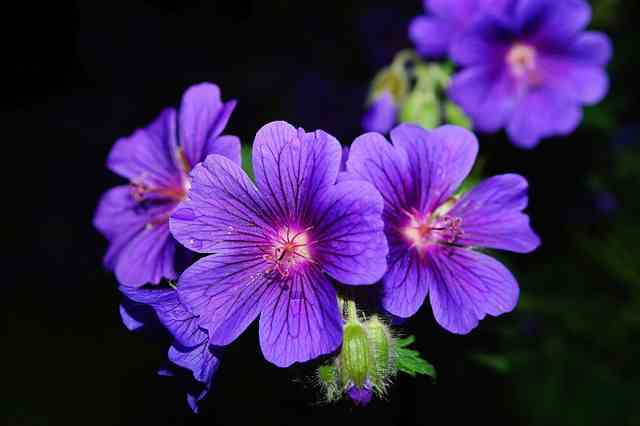
A multipurpose blooming plant, geranium (Pelargonium) is renowned for its pleasant aroma and decorative appeal. The mood-enhancing qualities of geranium essential oil, which is extracted from the plant’s leaves and flowers, make it useful in aromatherapy.
According to popular belief, the scent of geranium essential oil helps to elevate mood, lessen stress, and regulate emotions. One common application for it is to lessen anxiety and depressive symptoms. You may add geranium oil to bathwater, disperse it in the air, or dilute it with a carrier oil before massaging it.
The relaxing aroma of geranium may improve wellbeing and provide a peaceful environment. For anyone looking to use aromatherapy to reduce stress and enhance their mental condition, it is a healthy choice.
Another flower whose ability to elevate mood could surprise you is geranium. Its relaxing aroma might assist to create a relaxed environment that lowers tension and anxiety. When applied to bathwater or diffused, geranium essential oil may be a healthy choice for anyone using aromatherapy to achieve emotional equilibrium.
Yarrow
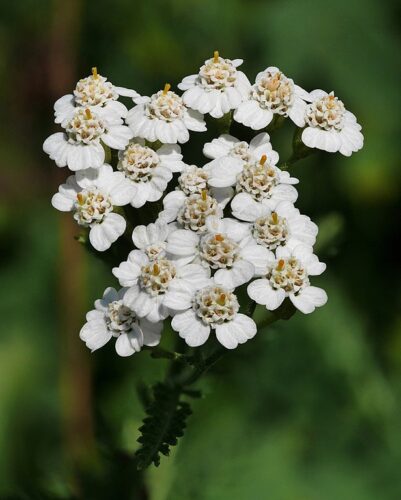
With clusters of tiny, pink or white flowers and feathery leaves, yarrow (Achillea millefolium) is a useful plant. While yarrow is most often utilized for its ability to cure physically, such as to mend wounds and relieve pain, it may also have an indirect positive effect on mental health.
Because of its anti-inflammatory qualities, yarrow may help lessen the pain and discomfort that is associated with stress on the body. To relieve tense muscles and encourage relaxation, use directly as a poultice or blend it into a bath.
Traditional medicine has also long used yarrow as a treatment for uneasiness and anxiety. Although research on its direct effects on mental health is not as extensive as that of some other herbs, its capacity to reduce the bodily manifestations of stress may enhance one’s overall feeling of wellbeing.
Though yarrow is most often associated with physical healing, it also indirectly improves mental health by lessening the pain and suffering that comes with stress on the body. A more at ease body may contribute to a more peaceful mind, and yarrow’s anti-inflammatory qualities can help achieve this equilibrium.
Lily
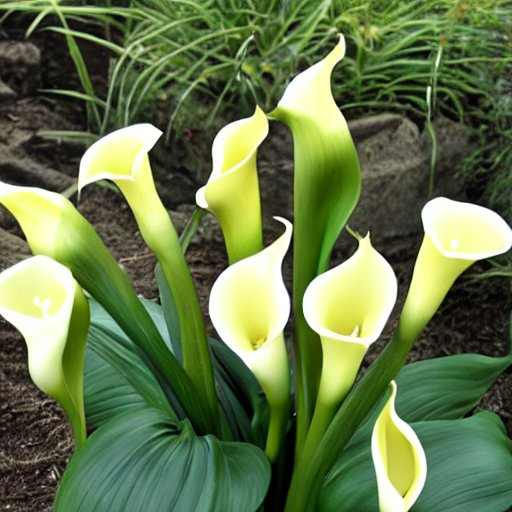
Lilies (Lilium), which are lovely and fragrant flowers, symbolize purity and regeneration. The appearance of lilies may improve mental health, despite the fact that they are often associated with ceremonies and festivities.
Lilies have a calming scent that may encourage calmness and relaxation. Due to their ability to lower tension and anxiety when inhaled, lilies are a popular flower option for floral arrangements in environments that aim to promote calm and relaxation.
Lilies may also act as a gentle reminder of the value of pausing to enjoy life’s little joys and the splendor of the natural world. A calm and pleasant atmosphere that fosters mental health may be created by surrounding oneself with lilies.
Though their aroma is more often associated with elegance and beauty than mental health, lilies may instill a sense of quiet and relaxation. Since lilies have a calming scent, they are a lovely accent to spaces that aim to promote calm.
Iris
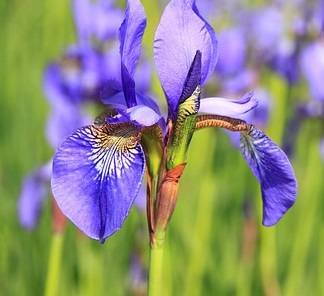
Beautiful flowers with exquisite iris-shaped blossoms are the hallmark of the iris (Iris germanica). Creativity and inspiration are often associated with it. Iris flowers are not often employed in herbal medicines, but their aesthetic appeal may benefit mental health.
Iris petals’ vivid hues and distinctive patterns have the power to inspire creativity and amazement. Having iris flowers all around you or seeing iris flower-themed artwork may cheer you up and inspire.
The appearance of irises might act as a reminder to foster one’s creativity and self-expression, which are crucial components of mental health. The beauty of irises may inspire and provide delight to those who engage in gardening, painting, or other creative pursuits.
Iris’s distinctive and colorful petals may not directly affect mental health, but its striking beauty may brighten the soul and stimulate creativity. The beauty of irises may encourage creative pursuits like painting or gardening, which can improve mental health and happiness.
In conclusion, each of these fifteen flowers has special characteristics and meanings that help enhance mental health and general wellbeing. Incorporating these flowers into everyday life is a natural method to support emotional and psychological health, whether it’s via their vivid colors, calming smells, or symbolic meanings.
